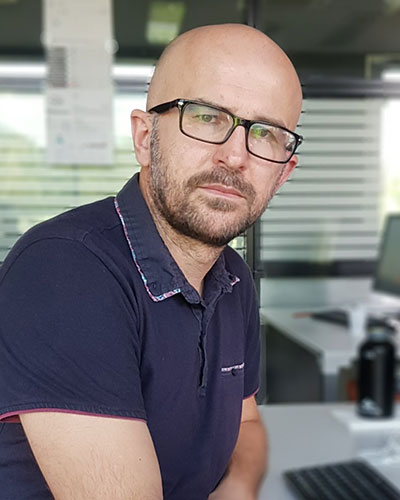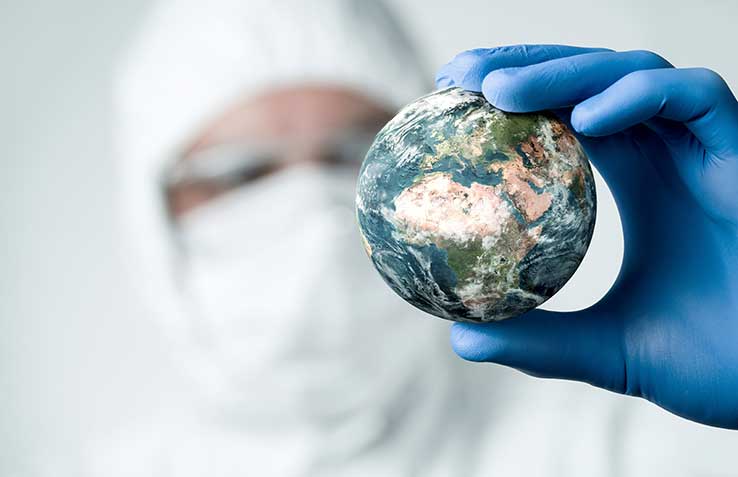Mladen Obrenović

At the onset of the corona crisis, the ‘spotlight’ was directed at experts for a while, because answers were expected of them. The ‘gratitude towards the virus’ for once again shining the limelight on expertise and science, on individuals and collectives who can help the community with their knowledge and skills, was short-lived - until politicians recognized the opportunity.
Crisis situations, and the crisis caused by the spread of coronavirus that brought the disease COVID-19 is one of the largest in modern times, require responsible behaviour and action in all segments of society. Everyone suffers the consequences – starting from the individual, who is most endangered and exposed to the risks of a vicious and dangerous disease, to the collective (whether in the more narrow or wider context, such as a family, a class or a work organization, to the level of society and the state as highest organizational units). Therefore, it is important how each individual will react, how they will understand their role in society and how they will help themselves and others.
In such crisis situations, the way in which politicians behave, the statements they make, the decisions they make, and what they actually do is very important, since they assume responsible roles - from the municipal and city level to the level at which necessary measures are taken and implemented. Some Balkan politicians, just like numerous other heads of much more powerful states, showed considerable imprudence with their reckless statements. The above can be confirmed by taking only three states as an example (Bosnia and Herzegovina, Croatia and Serbia) in which three related languages are spoken - Bosnian, Croatian and Serbian – and giving a cursory glance at some statements.
Although the statements of the Prime Minister of Bosnia and Herzegovina’s entity Federation of BiH, Fadil Novalić (who graduated from the Faculty of Mechanical Engineering, University of Sarajevo, so he has no knowledge in the scientific fields that focus on viruses and diseases) who is in his second, albeit technical term in office (which is not due to his competencies, rather than the disagreements of the leading Bosniak and Croat parties) seem hilarious to many, they certainly are not in the context of the corona crisis.
"If we were to act like a state, we would have procured the vaccine in December, but it doesn't matter," Novalić stated in the days when Bosnia and Herzegovina i.e., both its entities, had not procured any vaccines, except those coming from donations. And it was very important… Then, in the same spirit and in a similar style, he explained that Bosnia and Herzegovina "has no intentions of jumping the gun" for vaccines because they did not want to be "lab rats", and then he concluded, in Alan Ford fashion: "First we need to have vaccines in order to run a vaccination campaign. "
The procurement of vaccines has also become a case for the Prosecutor's Office of Bosnia and Herzegovina after a group of citizens filed a formal complaint in March against four officials – coming from state and entity levels - who they believe are responsible for endangering the health of the population. The report states that they have a well-founded suspicion that in a six-month period - from September 2020 to March 2021 - they have not performed or conducted their official duties regarding the provision and direct procurement of vaccines needed for immunization of the population. It was also pointed out that their "abuse of official duty results in the uncontrolled spread of the contagious disease, the death of a larger number of people, and the denial of the right to health care."
The Prosecutor's Office of BiH opened a case, started collecting information and invited retired infectious disease specialist Bakir Nakaš for a hearing in the capacity of complainant on behalf of several persons. Since then - an additional half a year has passed - there has been little talk in the media about this case. The situation with the pandemic calmed down, vaccines arrived (now there are too many, because citizens do not want to get vaccinated), and everything seems to have faded from memory, including the drama that the patients and their families went through this spring.
And what do architects and lawyers think about the coronavirus?
The citizens of Bosnia and Herzegovina know best how healthcare institutions, overburdened by administration and politics, fought to save every life at that time, so the claim of Bakir Izetbegović (Faculty of Architecture, University of Sarajevo), chairperson of the House of Peoples of the BiH Parliament and head of the Democratic Action Party (SDA), about combating the virus and the disease sounds pretty cynical.
"Mistakes have been made and there were oversights, but the truth that the numbers show and prove is different from the perception. It may seem somewhat unbelievable to people, but Bosnia and Herzegovina is probably the most successful in the region in nearly all respects, along with the two problems with the supply of respirators and the slow supply of vaccines, and slightly better than the EU average when it comes to slowing the spread of infection and from an economic aspect ", Izetbegović believes.
In his own style and in a very crude way, the situation in the neighbourhood was described by Croatian President Zoran Milanović (Faculty of Law, University of Zagreb).
"Bosnia and Herzegovina is the most successful in this matter. No one is sick or dying there, there are no people in hospitals, no one is talking about it, and no one is getting vaccinated," Milanovic said ironically. Bosnia and Herzegovina, quite expectedly, interpreted this as an insult. The statement was followed by a call to declare him persona non grata.
"He showed an absolute lack of diplomatic skill, political correctness, empathy, but also an excess of arrogance, chauvinism and political primitivism by which he seeks to gain his own greatness, by humiliating others," was the statement of the Our party (Naša stranka).
 Source: shutterstock.com
Source: shutterstock.com
From pleas and promises to threats and intimidation
Croatia did, however, donate a certain quantity of vaccines to Bosnia and Herzegovina, allowing part of the population of the neighbouring country to be vaccinated in their healthcare institutions. But much more has been done by Serbia, which has opened the doors to all its capacities to neighbours facing a shortage of vaccines - without notice.
The first donation was personally brought to Sarajevo by Serbian President Aleksandar Vučić (Faculty of Law, University of Belgrade). Unlike the statements, which took various forms - from pleas and promises to threats and intimidation, aimed at the population of Serbia to whom he addressed almost every day (and on many other topics, of course), he kept the messages to neighbours in check.
It has long been unclear what his constitutional powers are, but depending on the position he holds - whether deputy prime minister, prime minister or president - Vučić is always a key player in the field. This was the case even before the coronavirus arrived in Serbia, when he claimed that "soap is the best medicine" and along the way laughed at the not-at-all-funny jokes of pulmonologist Branimir Nestorović about "the most ridiculous virus in human history" and calls for women to "freely go shopping in Italy, because there will be big discounts now” (while in Italy, especially in the north, they fought for every life). This was also the case when he declared war against the coronavirus, and took on the role of decision-maker, but also main communicator. His communications had elements of pleas, addressing citizens with "I beg of you…" and slightly more threats such as "the cemeteries will not be large enough".
Politics that simply do not care about anything
These examples are just part of the reckless statements of Balkan politicians over the past year and a half. Everything else in that period could come to a standstill - be it manufacture, traffic, cultural events, religious services, sports competitions, even gatherings of citizens in any form - but politics did not pay any mind to that. Their activities were not interrupted. Pushed back by only a week or a month, elections were held at all levels, and the campaigns were conducted as if during happy times. Politicians adeptly took advantage of the pandemic.
When the crisis hit, however, the spotlights were directed at experts for a while because answers were expected of them. The coronavirus, at least at that time (as noted by writer and columnist Jurica Pavičić), "contributed to the restoration of the authority of knowledge".
"Portals, newspapers and TV stations were suddenly dominated by professors and doctors. There is no reputable newsroom that did not call for the help of a prominent expert from Berlin, Edinburgh or Harvard, and the readership indicators on the portals show that suddenly the most read were the texts that should otherwise be the core of journalism," Pavičić concluded.
Nevertheless, the ‘gratitude towards the virus’ for once again shining the limelight on expertise and science, on individuals and collectives who can help the community with their knowledge and skills, was short-lived - until the first election campaigns, and then the elections. Then, it became evident that those who knew how to take the necessary measures, how to explain them to the people and how to calm down any potential panic were mostly partisan pawns. Or at least at the parties’ beck and call. And that it was on their merits that the commanders - and all politicians used war rhetoric, adorned themselves with high ranks and praised their heroic deeds - collected the election laurels. Then the post-election cards were shuffled, many took the same chief, mayoral or ministerial positions, some were given other positions, and the fight against the coronavirus took on its previous outlines. The same old disappointment and distrust in those who lead society and the state has returned among the citizens.
Scientists gathered in the Balkans in Europe Policy Advisory Group (BiEPAG) believe that trust is a key prerequisite for a positive relationship between citizens and the state. According to them, during the pandemic, trust "rests on three benchmarks: accurate information, immediate protection (public health and services) and fending off the negative economic impact for longer-term stability." Concluding that all three dimensions of trust are "weak", they note that "the crisis has revealed the full extent of long-term, systematic failures of the main state institutions." They are especially focused on the media.
"Lack of reliable and accurate information, combined with irresponsible statements by government officials, adds to the collective stress and destroys trust in the state […] Misleading reporting, including by media close to governments, as well as misleading statements by governments themselves, have eroded societal trust, including citizens’ trust in the state ", BiEPAG includes in its report.
Fighting the infodemic
A month before declaring a pandemic, the head of the World Health Organization (WHO), Tedros Adhanom Ghebreyesus, opened a new front, pointing to the need to fight the infodemic. He noted that "fake news spreads faster and easier than a virus", and noted that it is "just as dangerous". He called on Facebook, Twitter and Google, among others, to "oppose the spread of rumours and misinformation", and on the authorities, companies and media organizations not to "fan the flames of hysteria".
"Now more than ever is the time for us to let science and evidence lead policy. If we don’t, we are headed down a dark path," Adhanom warned.
After his cautionary appeal, the world, and with it the Balkans, is mostly headed down a dark path. Politics impose an agenda that is an absolute imperative, and areas of human action that have an answer or at least can offer one are relegated to the side-lines.
In this aspect, it is especially important that journalists do not assist politicians in implementing such practices and for them to allocate exposure to scientific authorities that they actually deserve. An expert and/or scientist is certainly more likely to contribute to the solution of the health crisis than a politician. The latter can only help and facilitate the proposed solutions, there is no need to take up space and set up obstacles. And when the crisis passes, we should continue to listen to experts, because there is often no concrete benefit from political discourse, which is usually all talk.
In fact, they should, as Croatian politician and intellectual, Božo Kovačević, suggests, "be able to explain to citizens which policies are best for them in the long run and fight for them in an open and well-argued democratic debate."
Please refer to the Terms before commenting and republishing the content.
Note: The views and opinions expressed in this article are those of the author and do not necessarily reflect the views of the Institute of Communication Studies or the donor.


